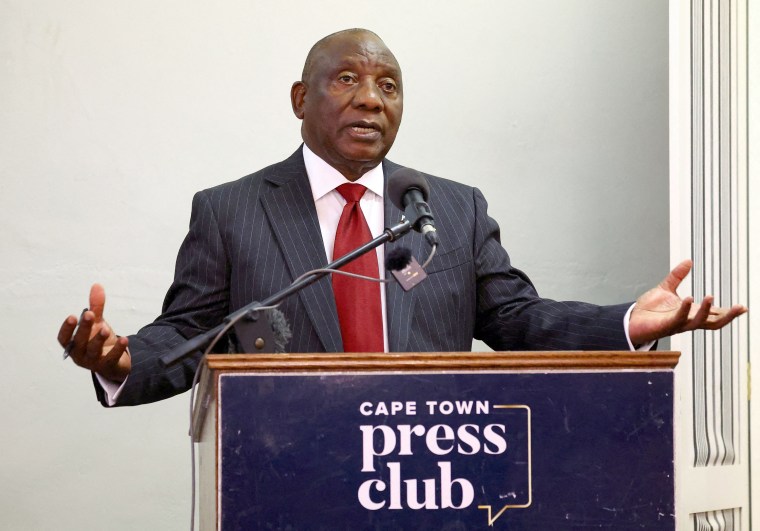Lusaka, April 10, 2024–The Committee to Protect Journalists on Wednesday welcomed South African President Cyril Ramaphosa’s signing into law a bill that abolishes criminal defamation, and urged authorities to reform other problematic laws that threaten press freedom.
On April 3, Ramaphosa signed the Judicial Matters Amendment Act (2023), which includes a provision repealing “the common law relating to the crime of defamation,” according to news reports and a statement by the president’s office. Parliament forwarded the bill to Ramaphosa for signature after approving it in December last year.
South Africa becomes the latest country in southern Africa to decriminalize defamation, following its neighbors Zimbabwe (2014) and Lesotho (2018). Other countries in the Southern African Development Community regional bloc which continue to use criminal defamation against journalists include Angola and the Democratic Republic of the Congo, according to CPJ research.
“The long-awaited repeal of the crime of defamation in South Africa is an important victory for press freedom and hopefully will reverberate positively across other parts of the region, such as Angola and the Democratic Republic of the Congo, where defamation continues to be used to criminalize journalism,” said Angela Quintal, head of CPJ’s Africa program, in New York. “South African authorities should also move swiftly to reform other laws, as well as draft legislation that threaten, or have the potential to undermine media freedom and the public’s right to information.”
South Africa’s parliament voted to abolish the common law crime of defamation, which is based on Roman Dutch Law and court precedents, on December 6, 2023, after decades of advocacy by the press, media lawyers, and civil society activists who argued that there were other remedies that did not involve prosecution or jail, such as civil defamation lawsuits for aggrieved parties who believed their reputations were impugned.
The 2013 conviction of newspaper journalist Cecil Motsepe was the most recent case in which a South African journalist was found guilty of criminal defamation, according to a guide on South African media law by the Thomson Reuters Foundation, a philanthropic body that works to advance press freedom. The conviction was overturned on appeal in 2014, although the court ruled that criminal defamation remained constitutional. CPJ was among a group of organizations that filed an amicus brief in support of Motsepe, arguing for the decriminalization of defamation in South Africa.
Despite the repeal of criminal defamation, several problematic laws remain, including the Cybercrimes Act, according to press freedom advocates. In a 2022 Universal Periodic Review submission, CPJ and four partner organizations urged South African authorities to amend the Cybercrimes Act, which lacks public interest overrides for journalists and could affect the ability to publish leaked information. The organizations also called for reform of the Protected Disclosures Act in order to strengthen protection for whistleblowers and the Prevention and Combating of Hate Crimes and Hate Speech Bill, which criminalizes speech on broad terms and which commentators fear could undermine public debate. That bill is pending presidential approval.
Justice Deputy Minister John Jeffery told CPJ that the lack of a public interest override was not raised during public submissions about the proposed Cybercrimes Act. The justice department was not averse to making changes to draft laws if threats to press freedom arose, and it had done so previously, even when journalists had raised concerns at the eleventh hour.
Civil society groups also raised concerns about the General Intelligence Laws Amendment Bill currently before Parliament, arguing in December that it posed a threat to democracy. When the bill was first tabled in December, critics feared that the power given to state security to vet individuals who accessed national key points, including the public broadcaster SABC, was a threat to journalists’ independence. Although several amendments were subsequently made, free expression groups remain concerned that SABC journalists could be targeted on the pretext that intelligence services were establishing their trustworthiness. The National Assembly approved the revised bill last week, and it is now before the National Council of Provinces for processing.
State Security Agency spokesperson Sipho Mbhele did not respond to CPJ’s requests by messaging app and phone for comment.
Caroline James, the amaBhungane Centre for Investigative Journalism’s advocacy coordinator, told CPJ that there were other laws and draft legislation that indirectly affect media freedom, contributing to a lack of transparency and restricting access to information for journalists and the public, including the Protection of Personal Information Act and Public Procurement Bill.
Quintal is a non-executive board member of amaBhungane.
Since the advent of democracy in 1994, South African courts have generally acted as a bulwark against threats to press freedom, including striking down efforts to legally gag the media or judicially harass journalists.
